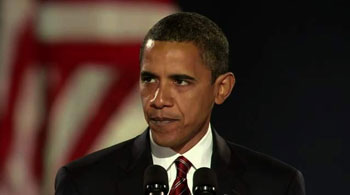
On the eve of Barack Obama’s historic inauguration, FRONTLINE examines the rich personal and political biography of America’s 44th president, offering insight into the key moments and experiences that have shaped him and formed his political vision.
The story begins at the Democratic Convention in 2004 when Barack Obama, a little-known candidate for the U.S. Senate from Illinois, stepped forward to tell his personal story and to call for a move beyond partisan politics.
“All around were people with tears in their eyes,” Obama’s chief political adviser David Axelrod tells FRONTLINE. “And I realized at that moment that his life would never be the same.”
FRONTLINE reviews the critical life experiences that made Obama uniquely suited to launch his successful campaign to become the country’s first African American president: his community organizing days in Chicago, his presidency of the Harvard Law Review, and his rise to the top of Illinois politics, in the course of which he learned how to navigate America’s complicated racial and political divides.
“Barack has had to deal with dueling identities all of his life,” his longtime friend and current adviser Cassandra Butts tells FRONTLINE. “He [was] nurtured by a white family, identifying with that family, but at the same time, ... when he goes out he’s identified as something else. And he has had to make sense of that duality his entire life.”
As a young man recently out of college, Obama went to Chicago, a city some call the “capital of black America,” to work as a community organizer and try to sort out his dual identities. Colleagues say that after a few years he had found peace with who he was, but had become frustrated by his inability to change the larger structural problems behind the poverty he saw in Chicago’s South Side.
That frustration led him first to Harvard Law School, where amidst the heated racial disputes of that time he became the middleman -- a conciliator. He then returned to Chicago and quickly found himself in the the rough-and-tumble world of Illinois politics.
“I think the sort of iconlike image that Obama has attained in this country, sometimes blinds us to the fact that he wasn’t born onstage in 2004, but had to rise through the ranks of machine politics in Chicago to get where he is,” New Yorker writer Ryan Lizza tells FRONTLINE.
During those early years in Chicago, Obama put down roots in the black community: He joined Trinity Church and was influenced by its minister, Jeremiah Wright; he took on civil rights cases, led a voter registration drive, won a bitter battle for the state Senate; and, perhaps most importantly, he married a young woman from the predominantly black South Side, Michelle Robinson.
“Her roots in Chicago went deeper than his roots in Chicago,” says the Rev. Jesse Jackson. “She went to public school, and she and my daughter were classmates; they were friends. And so, she would know people he did not know in places he would not know.”
Obama modeled his earliest political efforts after those of Chicago’s first black mayor, Harold Washington. “Washington had to be perceived as somebody who was prepared to be mayor of all of the people of Chicago, not just a mayor for the black community,” Alderman Toni Preckwinkle tells FRONTLINE.
Obama would follow Washington’s strategy and build his own coalition of progressive whites, African Americans and Latinos -- a coalition that would eventually carry him to the United States Senate. “Obama comes along with a message that says: ‘We’re going to look beyond red and blue. I am going to transcend many of these traditional divisions, not only ideological and partisan but also racial,’” says author Ron Brownstein. “And he embodies his message in a unique way, and I think that, to me, is the core of his political strength.”
The film details how, after his election to the U.S. Senate, Obama and his advisers implemented a carefully crafted two-year plan that built the freshman senator’s reputation and led to his announcement in early 2007 that he would run for president.
“Now, as he takes office facing the worst financial crisis since the Great Depression and wars in Iraq and Afghanistan, illuminating the central experiences that formed Barack Obama and led to his meteoric rise to the presidency can help us understand the man the country has chosen to lead it through these perilous times,”says FRONTLINE producer Michael Kirk.
Note: This program draws from the critically acclaimed The Choice 2008, an election special on Obama and John McCain. However, Dreams of Obama includes new interviews, footage and reporting on key moments in Obama’s personal and political history.